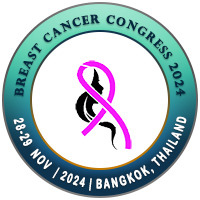
Anna Tompa
Semmelweis University, HungaryTitle: Geno- and immunotoxic effects of cytostatic exposure, testing peripheral blood lymphocytes among employee of Hungarian Oncology Departments
Abstract
Introduction: Geno-toxicological biomarkers can be used as tools to detect the damages caused by the environmental and occupational mutagens and carcinogens acquired by the somatic cells. The most effective approach to avoid cancer is to keep away the cancer-causing agent (primary prevention). These biomarkers can be utilized as indicators of exposures, effects and individual susceptibility to cancer. Sampling of biomarkers in relation to exposure may have a great impact on the reliability of mechanism of action and early prevention of different chronic diseases, as malignant diseases. Nurses handling cytotoxic drugs are being exposed to carcinogenic agents. These drugs have the potential to interrupt cell cycles and introduce chromosomal aberrations.
Methods: A nationwide representative sample of more than 800 nurses were investigated by a follow-up geno-toxicological monitoring system, developed by our laboratory, including the tests of chromosomal aberrations, DNA-repair capacity, Comet assay and immunological parameters measured on peripheral blood lymphocytes bay FACS methods. These findings were compared to non-exposed hospital workers and historical controls, as well as their own data measured in earlier time (self-control).
Results: The biomarkers like the presence of high chromosomal aberrations can also indicate the need of intervention in high risk groups beside the low level of occupational exposures of cytostatic drugs. During this follow-up geno-toxicological study the health condition of nurses, preparing and administering various cytostatic infusions was observed. These geno-toxicological and immune-toxicological changes were correlated to other clinical parameters, (iron deficiency, anemia, thyroid diseases, cancer etc.). These results raise concerns about the protection of nursing staff from chemical carcinogens in the working environment. We report about the start of a new follow-up study to investigate how a closed system drug transfer device (Tevadaptor®) may reduce the carcinogenic risk in nurses. We suggest that the most effective approach to avoid cancer is to keep the cancer-causing agent away from nursing staff (primary prevention) and keep the standard of environmental safety.
Biography
Professor Anna Tompa was graduated in medicine in Budapest Semmelweis Medical University and became an assistant professor at the Institute of Pathology and Cancer Research of the School of Medicine. After specialized in pathology she went to the United States to study the advanced methodology of experimental cancer research.. She has continued her research activities focused on the cancer prevention and obtained her D.Sc. in 1999 from Hungarian Academy of Sciences. She has written more, than 160 publications and given about 200 scientific lectures in different domestic and international congresses. She is a member of numerous domestic and international scientific societies, and presently she is emeritus fellow of Ramazzini Collegium and OECD expert in chemical safety. Today she is an emeritus professor and vice director of Public Health Institute in the Semmelweis University, Budapest, Hungary.

